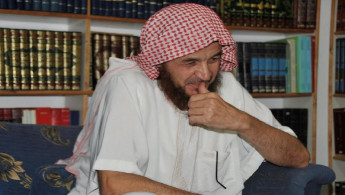Jordan releases Salafi leader Abu Mohammed al-Maqdisi
In a surprise move, Jordan's state security court has ordered the release of the Salafi-Jihadi ideologue Assem Barqawi as its air force bombed Islamic State group (IS, formerly known as ISIS) targets.
Barqaqi, better known as Abu Muhammad al-Maqdisi, had been detained without trial since October on suspicion of promoting terrorism on the internet.
Judicial sources told al-Araby al-Jadeed that Maqdisi's release was based on a decision that repealed a previous indictment.
The unexpected move suggests that Jordan wants to starve IS of support from Salafis in the country, many of whom have been shocked by the brutal murder of Captain - he was promoted posthumously from Lt. - Moaz El Kassassbeh by the extremist group.
Maqdisi was arrested on 27 October 2014 following a statement he published a statement on the Tawhid wal Jihad website which is associated with the preacher.
In the statement he called the international alliance's strikes against IS "a crusade", and described Arab nations taking part in the military action as "apostate armies".
He was charged with using the internet to promote the ideas of terrorist organisations. This charge falls under Jordan's anti-terrorism law, which is in the state security court's jurisdiction.
Maqdisi is considered to be in opposition to the IS group and he has previously accused the group of "defacing the image of jihad and Islam".
However, he also strongly opposed the US-led international alliance war on IS.
| Armed forces announced that the mission was named Operation Moaz al-Kassasbeh. |
Jordan, which is a part of the coalition, launched airstrikes against IS positions today in retaliation for the murder of Kassasbeh, who was a pilot in the Jordanian air force.
The armed forces announced that the mission was named after Kassasbeh.
The pilot was from Kerak, in Jordan's south, and fighter jets that took part in the air raid flew over the pilot's home city, where memorials to Kassasbeh have been taking place.
A government official in Amman said the "Jordanian air force launched raids against positions of the Islamic State group".
King Abdullah of Jordan was later briefed by the armed forces chief of staff on the strikes, a military statement said.
IS had previously beheaded two US journalists, an American aid worker and two British aid workers in similar videos. It has also killed two Japanese hostages.





 Follow the Middle East's top stories in English at The New Arab on Google News
Follow the Middle East's top stories in English at The New Arab on Google News
![Israeli forces ordered bombed Gaza's Jabalia, ordering residents to leave [Getty]](/sites/default/files/styles/image_330x185/public/2176418030.jpeg?h=a5f2f23a&itok=_YGZaP1z)

